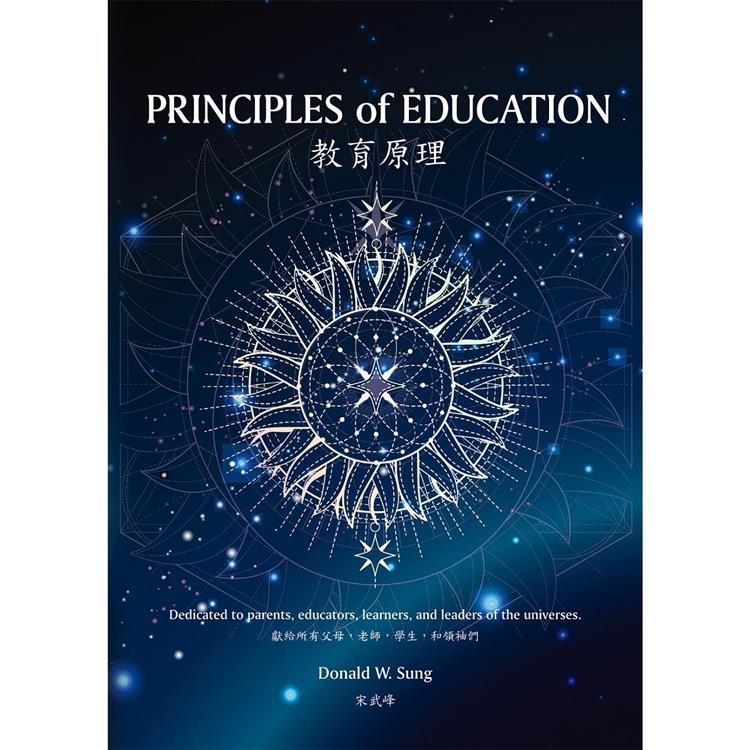活動訊息
內容簡介
以81個原理,從全方位的角度建立兒童教育理論架構,與孩子們一起成長,帶孩子們進入美妙的世界
◎根據學習者自身條件、生長環境,以及學習過程有關的各種原理,所發展出來的一套兒童教育理論。
◎本書能使孩子的智力、情感以及人際關係,隨著成長和生理狀況的變化而不斷的同時發展。
◎作者同時兼具法學博士、MBA、律師、會計師多種專業身分,中英對照,精闢解析。
The author is an attorney and C.P.A. Throughout his life, he has been questing and exploring common grounds for people and concluded that childhood education is the foundation for people, families, society, and the future of the world. He is very appreciative of the opportunities and education offered by society. In this book, he shares his principles of education as a giving back to society.
作者是位執業律師暨會計師。他一輩子在找尋人間的共通之處,得到兒童教育正是人們、家庭、社會及未來世界之基石的結論。他非常感激社會給他的教育和機會。在此書中分享了他的教育原理來回饋社會。
●This book shows you ways to
這本書告訴你如何去
‧Discover how people learn
發覺人們是怎麼學習的
‧Guide our children
引導我們的孩子們
‧Review effectiveness of education
檢討教育的效率
‧Explore tools for education
探尋教育之工具
‧Grow with children
與孩子們一起成長
‧Introduce children to a wonder world
帶孩子們進入美妙的世界
Dedicated to parents, educators, learners, and leaders of the universes
獻給所有父母、老師、學生和領袖們
目錄
Acknowledgments
致謝
Preface
前言
Part I - Learner’s State 第一部 – 學習者的狀況
1. Body Function Curve Principle
身體功能發展原理
2. Gross Capacity Principle
整體能力原理
3. Free Capacity Principle
可供自由使用的能力原理
4. A Person’s State Principle
個人狀況原理
5. Potential of a Person Principle
個人學習潛力原理
6. Learning and Physiology Correlation Principle
學習與生理相關性原理
7. Trammel State Principle
阻礙狀態原理
8. Principle of Physical and Mental State Co-Relationship
身體與心理交互作用原理
9. Principle of Latency in a Person’s Change of Physical and Mental State
一個人的身體與心理狀況改變的潛伏期原理
10. Dominant State Principle
顯性狀態原理
11. Recessive State Principle
隱性狀態原理
12. Critical State of Existing Knowledge Principle
知識臨界點(關鍵點)原理
13. Information Management Principle
資訊管理原理
14. Ideal Education Principle
理想教育原理
15. Pursuance of Betterment Principle
追求更好原理
16. Motive Principle
動機原理
17. Desire Principle
渴望原理
18. Motivation Principle
驅策力量原理
19. Action Principle
行動原理
20. Self-Sufficiency Principle
自給自足(不用依賴別人)原理
21. Confidence Principle
信心原理
22. Principle of Comfort Zone
舒適圈原理
23. Effect of Education Principle
教育效果原理
24. Act in Time Principle
及時行動原理
25. Limited Resources Principle
有限資源原理
26. Relevant Factors Principle
相關因素原理
27. Learning Path Principle
學習途徑原理
28. Priority Principle
優先順序原理
29. Time Factor Principle
時間因素原理
30. Knowledge Accumulation Principle
知識累積原理
31. Personal Condition Principle
個人狀況原理
Part II - Learner’s Interactions with Environment 第二部 學習者與環境的互動
32. Environment Principle
環境原理
33. Trust Factor Principle
信賴因素原理
34. Critical State for Learning Principle
學習的關鍵狀況原理
35. Window of Opportunity for Learning Principle
學習機會窗口原理
36. Dwindling Window of Opportunity for Learning Principle
學習機會窗口逐漸變小原理
37. Development of Learner’s Potential Principle
學習者潛能發展原理
38. Education Priority Principle
教育優先順序原理
39. Bond Principle
人際關係原理
40. Distancing Principle
保持距離原理
41. Family Tie Principle
家庭關係原理
42. Family Education Principle
家庭教育原理
43. Total Education Principle
全面教育原理
44. Connection Principle
關聯原理
45. Attachment Principle
親近感原理
46. Transmission Princip29
傳播原理
47. Imperfection Principle
不完美原理
48. Education Limit Principle
終極教育原理
49. Approaching an Education Goal Principle
接近教育目標原理
50. Principle of Tool
工具原理
51. Principle of Guidance
輔導原理
Part III - Introducing a Learner to the World 第三部 引領學習者踏入現實世界
52. Group Principle
群體原理
53. Principle of Stage
階段原理
54. Principle of Growing Stage
成長階段原理
55. Principle of Maintenance Stage
(Dedicated to Dr. George Forman on 12/24/2021)
維持階段原理 (獻給喬治福爾曼博士12/24/2021)
56. Principle of Open Communication
公開溝通原理
57. Principle of Over-Expressive
過度表達原理
58. Outreach Motive Principle
擴大動機原理
59. Principle of Outreach
延伸原理
60. Principle of Demand
要求原理
61. Principle of Conflict
衝突原理
62. Partial Conflict Resolution Principle
部分解決衝突原理
63. Conflict Duration Principle
衝突持續期間原理
64. Principle of Conflict Resolution
衝突解決原理
65. Principle of a Window of Opportunity for Conflict Resolution
解決衝突機會窗口原理
66. Principle of Setback
挫敗原理
67. Principle of Giving
贈與原則
68. Principle of Negotiation
協商原理
69. Principle of Holdback
裹足不前原理
70. Principle of Incentive
誘因原理
71. Principle of Competition
序/導讀
Preface
前言
The human brain and the human body are very complicated, and so is human education. This book presents a childhood educational theory with a system of principles of a learner’s conditions, environment, and educational processes.
人的大腦和身體結構非常複雜,因此人的教育也不容易一蹴可幾。本書介紹一套兒童教育理論,它是根據和學習者自身條件、生長環境以及學習過程有關的各種原理所發展出來的一套思想體系。
The system recognizes that a child’s intelligence, emotions, and social interactions continue to develop in tandem with his growth and bio-physical conditions. This is a system with dynamic principles, such as the time factor principle, the pursuance of betterment principle, and the latency in a person’s change of physical and mental state principle. These principles may vary with time and should be applied in tandem with the changes in the learner’s condition as well as his learning environment.
這個思想體系考慮到孩子的智力、情感以及人際關係會隨著他的成長和生理狀況的變化而不斷同時發展。它的原理常常是動態的,如時間因素原理、追求改善原理、人的身心狀態變化潛伏期原理等。這些原則可能會隨時間而變化,應與學習者狀況和學習環境的變化同步推出應用。
The system attends to the negative impacts and other side effects of an educational process. These unwanted side effects may accumulate and cause potential difficulties and problems in the future.
該系統關注教育過程的負面影響以及其他副作用。這些不必要的副作用可能會累積
並在未來造成潛在的困難和問題。
Education impacts a child throughout his life, which is why this system presents principles, such as maintenance stage principle and conflict resolution principle, that may be consistently applied throughout children’s lives.
教育會影響孩子的一生,這就是為什麼該系統提出的原則,例如維持階段原則和衝突解決原則,可以應用在孩子的一生中始終如一。
More than one principle in the system may be applied to a learner’s situation. An effective guidance may be created by applying a combination of these principles.
可以同時應用系統中一個以上的原則以應付學習者的情況。可以通過應用這些原則的組合來創建有效的指導。
The principles are divided into three groups: learner’s state (functions and conditions), learner’s interactions with environment, and introducing a learner to the world. These principles are interdependent. Hopefully the readers may internalize and combine them into a complete educational theory.
這些原則分為三組:學習者的狀態(功能和條件),學習者與環境的互動以及引導學習者踏入社會。這些原則是相互依存的。希望讀者可以將它們內化並組合成一個完整的教育理論。
Donald W. Sung, J.D., M.B.A.
May 25, 2022
宋武峰 (唐納宋) 法學博士/企管碩士
2022 年 5 月 25 日
訂購/退換貨須知
購買須知:
使用金石堂電子書服務即為同意金石堂電子書服務條款。
電子書分為「金石堂(線上閱讀+APP)」及「Readmoo(兌換碼)」兩種:
- 請至會員中心→電子書服務「我的e書櫃」領取複製『兌換碼』至電子書服務商Readmoo進行兌換。
退換貨須知:
- 因版權保護,您在金石堂所購買的電子書僅能以金石堂專屬的閱讀軟體開啟閱讀,無法以其他閱讀器或直接下載檔案。
- 依據「消費者保護法」第19條及行政院消費者保護處公告之「通訊交易解除權合理例外情事適用準則」,非以有形媒介提供之數位內容或一經提供即為完成之線上服務,經消費者事先同意始提供。(如:電子書、電子雜誌、下載版軟體、虛擬商品…等),不受「網購服務需提供七日鑑賞期」的限制。為維護您的權益,建議您先使用「試閱」功能後再付款購買。










商品評價